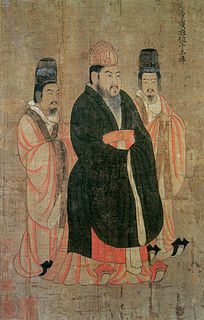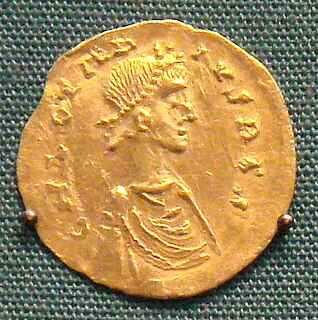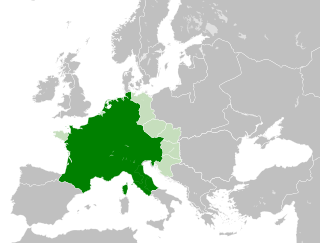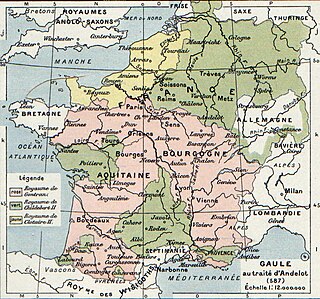
Year 604 (DCIV) was a leap year starting on Wednesday of the Julian calendar. The denomination 604 for this year has been used since the early medieval period, when the Anno Domini calendar era became the prevalent method in Europe for naming years.

Chlothar II, called the Great or the Young, was King of Neustria and King of the Franks, and the son of Chilperic I and his third wife, Fredegund. He started his reign as an infant under the regency of his mother, who was in an uneasy alliance with Clothar's uncle Guntram, King of Burgundy. Clothar assumed full power over Neustria upon the death of his mother, in 597; though rich this was one of the smallest portions of Francia. He continued his mother's feud with Queen Brunhilda of Austrasia with equal viciousness and bloodshed, finally achieving her execution in an especially brutal manner in 613, after winning the battle that enabled Chlothar to unite Francia under his rule. Like his father, he built up his territories by moving in after the deaths of other kings.

Francia, also called the Kingdom of the Franks, or Frankish Empire was the largest post-Roman barbarian kingdom in Western Europe. It was ruled by the Franks during Late Antiquity and the Early Middle Ages. It is the predecessor of the modern states of France and Germany. After the Treaty of Verdun in 843, West Francia became the predecessor of France, and East Francia became that of Germany. Francia was among the last surviving Germanic kingdoms from the Migration Period era before its partition in 843.
Wihtred was king of Kent from about 690 or 691 until his death. He was a son of Ecgberht I and a brother of Eadric. Wihtred ascended to the throne after a confused period in the 680s, which included a brief conquest of Kent by Cædwalla of Wessex, and subsequent dynastic conflicts. His immediate predecessor was Oswine, who was probably descended from Eadbald, though not through the same line as Wihtred. Shortly after the start of his reign, Wihtred issued a code of laws—the Law of Wihtred—that has been preserved in a manuscript known as the Textus Roffensis. The laws pay a great deal of attention to the rights of the Church, including punishment for irregular marriages and for pagan worship. Wihtred's long reign had few incidents recorded in the annals of the day. He was succeeded in 725 by his sons, Æthelberht II, Eadberht I, and Alric.
Luxeuil Abbey, the Abbaye Saint-Pierre et Sain-Paul, was one of the oldest and best-known monasteries in Burgundy, located in what is now the département of Haute-Saône in Franche-Comté, France.

Sonning is a village and civil parish in Berkshire, England, on the River Thames, east of Reading. The village was described by Jerome K. Jerome in his book Three Men in a Boat as "the most fairy-like little nook on the whole river".

Brunhilda was queen regent of Austrasia, part of Francia, by marriage to the Merovingian king Sigebert I of Austrasia.

Theuderic II (587–613), king of Burgundy (595–613) and Austrasia (612–613), was the second son of Childebert II. At his father's death in 595, he received Guntram's kingdom of Burgundy, with its capital at Orléans, while his elder brother, Theudebert II, received their father's kingdom of Austrasia, with its capital at Metz. He also received the lordship of the cities (civitates) of Toulouse, Agen, Nantes, Angers, Saintes, Angoulême, Périgueux, Blois, Chartres, and Le Mans. During his minority, and later, he reigned under the guidance of his grandmother Brunhilda, evicted from Austrasia by his brother Theudebert II.
Berhtwald was the ninth Archbishop of Canterbury in England. Documentary evidence names Berhtwald as abbot at Reculver before his election as archbishop. Berhtwald begins the first continuous series of native-born Archbishops of Canterbury, although there had been previous Anglo-Saxon archbishops, they had not succeeded each other until Berhtwald's reign.

January 21 - Eastern Orthodox liturgical calendar - January 23
Protadius was the mayor of the palace of Burgundy from 604, when he displaced his rival Berthoald, until his death two years later. He was originally the noble lover of Brunhilda, the grandmother of and regent for King Theuderic II. She, however, desired to raise him to status in the kingdom and had him given the patricianship over the lands east of the Jura, whose duke, Wandalmar, had died in 604. She then conspired to do away with Berthoald, mayor of the palace, by sending him with only 300 men to the region of the Seine. Attacked by Clotaire II of Neustria's son, Merovech, and his mayor, Landric, Berthoald died in the ensuing battle when he realised that he had nothing to lose, for he was no longer safe at court.

Somerford Keynes is a small village and civil parish in Gloucestershire, England, close to the River Thames and Thames Path about five miles (8 km) from its source and in the Cotswold Water Park. It lies on the boundary with Wiltshire midway between Cirencester, Swindon and Malmesbury. The parish population at the 2011 census was 479. The first beavers to be born in Britain for 400 years appeared at Lower Mill in 2008.
Landric was the mayor of the palace of Neustria. According to the Vita Aldegundis, he and his probable brother Gundoland were uncles of Saint Aldegunda. The chief sources for his reign are the Chronicle of Fredegar and the Liber Historiae Francorum.

Regulbium was the name of an ancient Roman fort of the Saxon Shore in the vicinity of the modern English resort of Reculver in Kent. Its name derives from the local Celtic language, meaning "great headland" (*Rogulbion).
The 600s decade ran from January 1, 600, to December 31, 609.








